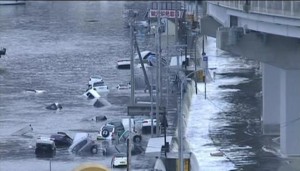 As someone new to praying the liturgy of the hours, I never before fully understood the place of the psalms in the prayer of the Church. “In [Christ],” the Catechism says, “the psalms continue to teach us how to pray”, so much so that the Church calls the psalms a “school of prayer” (2587 and index).
As someone new to praying the liturgy of the hours, I never before fully understood the place of the psalms in the prayer of the Church. “In [Christ],” the Catechism says, “the psalms continue to teach us how to pray”, so much so that the Church calls the psalms a “school of prayer” (2587 and index).
Praying the liturgy of the hours brings that home, for the psalms form the bulk of the prayers. Through them one relives salvation history and is caught up in how the drama of God’s romance with humanity intersects the quotidian realities of every kind of suffering with its attendant supplication heavenward.
Perhaps nothing calls forth more fervent prayers than great disasters such as the one just experienced by the people of Japan in the apocalyptic destruction wrought by Friday’s earthquake and tsunami. Watching the events, I thought of the lessons that I was finding afresh in the daily exposure to the psalms in the liturgy of the hours.
[Editor’s note: for your convenience and to encourage you in the habit of prayer, find links to the liturgy of the hours in both the ordinary form and the extraordinary form in the blue Church box right on the front page of Catholic Lane every day.]
Dependence
We are utterly and absolutely dependent upon God. God begins us and sustains us from moment to moment. All of creation is kept in existence by an act of His creative power, by His will continuously.
With creation, God does not abandon his creatures to themselves. He not only gives them being and existence, but also, and at every moment, upholds and sustains them in being, enables them to act and brings them to their final end. Recognizing this utter dependence with respect to the Creator is a source of wisdom and freedom, of joy and confidence (CCC 301).
The psalms constantly remind us that everything we are and have comes from God. They remind us that any solidity or permanence we seek or think we find in the things man makes is illusory. We are not only dependent; we are in ourselves weak and as fleeting as mist.
Surrender
God’s power is total and we are completely at His mercy.
When we see the devastating forces unleashed that crumble the work of human hands as easily as you might pulverize a dry leaf, that sweep human constructions away as easily as you blow dust from a shelf, and that toss buildings and vehicles as you might shuffle sand with your foot — we are not seeing God’s power. We are seeing the power of natural forces, infinitesimal in comparison to the power of God.
If we must bend before such power as nature exerts, why should we not bow abjectly before nature’s God? His ways are truly mysterious and appearances hide meaning from us. The psalms are replete with an interweaving pattern made of seeming contradictions:
- God’s people rebel against Him and suffer His wrath
- God allows His people to suffer even when they are faithful
- God punishes the wicked
- God allows the wicked to prosper
The bottom line is this: from the human perspective, we cannot deduce the favor or displeasure of God on any person or peoples by looking at what has or has not befallen them. There is nothing in the end but to declare with Job, “Naked I came from my mother’s womb, and naked shall I return; the LORD gave, and the LORD has taken away; blessed be the name of the LORD.”
Praise
As Job and the psalmists understood, while we have breath and under every circumstance, God is to be praised. He is to be praised for His superlative qualities and for giving us and every creature existence. Ultimately, whatever befalls us in this life, existence itself is a good thing.
Make a joyful noise to the LORD, all the lands! Serve the LORD with gladness! Come into his presence with singing! Know that the LORD is God! It is he that made us, and we are his; we are his people, and the sheep of his pasture. Enter his gates with thanksgiving, and his courts with praise! Give thanks to him, bless his name! (Psalm 100).
Hope
This life is short but God’s goodness to us transcends this life. Pain, destruction, and grief do not have the last word for us.
He does not deal with us according to our sins, nor requite us according to our iniquities. For as the heavens are high above the earth, so great is his steadfast love toward those who fear him; as far as the east is from the west, so far does he remove our transgressions from us. As a father pities his children, so the LORD pities those who fear him. For he knows our frame; he remembers that we are dust. As for man, his days are like grass; he flourishes like a flower of the field; for the wind passes over it, and it is gone, and its place knows it no more. But the steadfast love of the LORD is from everlasting to everlasting upon those who fear him (Psalm 103: 10-17).
No one suffers in this life now without the chance to have God give him or her a glorious new eternal life in a world without pain and sorrow. That is no platitude. That is the reality behind the wind, the waves, the quaking of the earth and whirling of the sea, for our God of power is a God of grace and mercy and everlasting love.
(© 2011 Mary Kochan)



